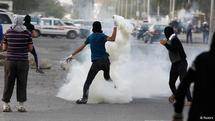
The postponement came amid escalating tensions in the Sunni-ruled kingdom after a week of near-daily anti-government protests that coincided with Sunday's controversial Formula One Grand Prix race.
Witnesses said the courthouse was cordoned off by security forces as the postponement was announced in an effort to prevent a planned protest by Al-Wefaq, the largest Shiite opposition group in Bahrain.
Among the activists appealing their conviction is Abdulhadi al-Khawaja, a dual Bahraini-Danish citizen who has been on hunger strike since February 8-9 to demand his release from prison, where he is serving a life sentence.
Amnesty in a statement on Monday slammed the postponement as "toying" with Khawaja's life.
"The Bahrain authorities' delay tactics are toying with the life of Abdulhadi al-Khawaja, who is on death's doorstep as he enters his 75th day on hunger strike," said Hassiba Hadj Sahraoui, Amnesty's deputy Middle East and North Africa director.
The London-based rights watchdog described the defendants in this case as "prisoners of conscience, held solely for peacefully exercising their right to freedom of expression amid anti-government protests last year."
On Sunday, a representative from Bahrain's public prosecution said Khawaja's doctors assured him that the Shiite activist "is in good and stable health and is getting all necessary medical care."
His deteriorating health has raised fears that he may die in prison, an event that could trigger widespread protests and further unrest in the Gulf kingdom.
Khawaja's wife, Khadija al-Moussawi, told AFP on Sunday that her husband "stopped drinking water" as of last Friday.
She said in a telephone call with him on Saturday that "his voice sounded weak and he spoke slowly."
Khawaja was convicted with 20 other opposition figures after mass protests which the government crushed last year in a crackdown that left at least 35 people dead, including five from torture, according to an independent probe.
Rights groups and western governments have repeatedly called for the release of Bahrain's political prisoners, but many remain in jail.
"The Grand Prix has come and gone but for the people of Bahrain, the media spotlight has moved on while Bahrain's authorities have yet to turn the corner on the human rights situation in the country," said Sahraoui.
The opposition had used the media presence for the race to intensify protests over the past week.
---------------------------------------------------------------------------------
Witnesses said the courthouse was cordoned off by security forces as the postponement was announced in an effort to prevent a planned protest by Al-Wefaq, the largest Shiite opposition group in Bahrain.
Among the activists appealing their conviction is Abdulhadi al-Khawaja, a dual Bahraini-Danish citizen who has been on hunger strike since February 8-9 to demand his release from prison, where he is serving a life sentence.
Amnesty in a statement on Monday slammed the postponement as "toying" with Khawaja's life.
"The Bahrain authorities' delay tactics are toying with the life of Abdulhadi al-Khawaja, who is on death's doorstep as he enters his 75th day on hunger strike," said Hassiba Hadj Sahraoui, Amnesty's deputy Middle East and North Africa director.
The London-based rights watchdog described the defendants in this case as "prisoners of conscience, held solely for peacefully exercising their right to freedom of expression amid anti-government protests last year."
On Sunday, a representative from Bahrain's public prosecution said Khawaja's doctors assured him that the Shiite activist "is in good and stable health and is getting all necessary medical care."
His deteriorating health has raised fears that he may die in prison, an event that could trigger widespread protests and further unrest in the Gulf kingdom.
Khawaja's wife, Khadija al-Moussawi, told AFP on Sunday that her husband "stopped drinking water" as of last Friday.
She said in a telephone call with him on Saturday that "his voice sounded weak and he spoke slowly."
Khawaja was convicted with 20 other opposition figures after mass protests which the government crushed last year in a crackdown that left at least 35 people dead, including five from torture, according to an independent probe.
Rights groups and western governments have repeatedly called for the release of Bahrain's political prisoners, but many remain in jail.
"The Grand Prix has come and gone but for the people of Bahrain, the media spotlight has moved on while Bahrain's authorities have yet to turn the corner on the human rights situation in the country," said Sahraoui.
The opposition had used the media presence for the race to intensify protests over the past week.
---------------------------------------------------------------------------------









 Home
Home Politics
Politics









